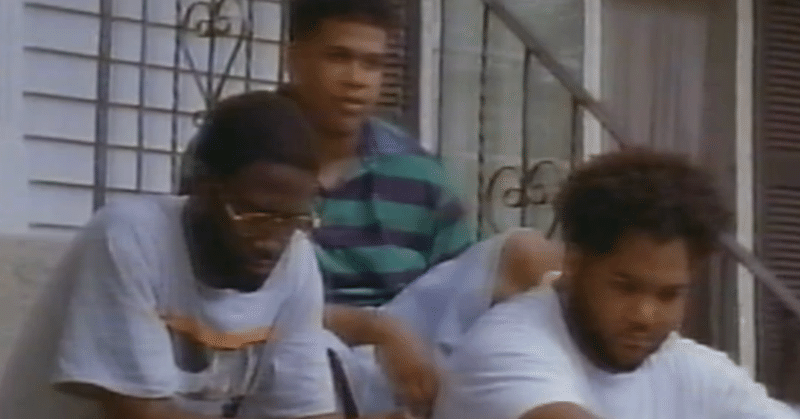
【デ・ラ・ソウル】英語ドキュメンタリーを日本語で読む【De La Soul】
デ・ラ・ソウルのドキュメンタリーです。
放送時期:1995年
※動画を再生してから読むのがオススメです。
In 1988, MTV began an all-rap segment.
1988年、MTVはすべてラップのコーナーを始めた。
It was an immediate success, showing that the audience for rap, like the audience for mainstream rock, now reached across barriers of color and class.
それはすぐに成功を収め、ラップの視聴者がメインストリームのロックの視聴者と同様に、人種や階級の壁を越えて広がっていることを示した。
But out of Los Angeles came a group with a video MTV refused to play.
しかし、ロサンゼルスからMTVが放送を拒否したビデオを持つグループが現れた。
Their raps were heavy with tales of gang warfare and misogyny.
彼らのラップはギャング戦争や女性蔑視の物語で重かった。
They called themselves N.W.A., Niggas With Attitudes.
彼らは自分たちをN.W.A.、Niggas With Attitudesと呼んだ。
Accused of fomenting gang violence and sexism with their records, even warned by the FBI for their anti-police lyrics, these so-called gangster rappers, including future stars Ice Cube and Dr. Dre, maintained they were simply depicting life as it's lived on the streets of Los Angeles.
彼らのレコードでギャング暴力や性差別をあおると非難され、FBIからさえも反警察の歌詞で警告されたが、アイス・キューブやドクター・ドレーを含むいわゆるギャングスタ・ラッパーたちは、単にロサンゼルスのストリートでの生活を描いているだけだと主張していた。
While some rap producers seemed intent on testing the limits of decency, from the suburbs of Long Island came De La Soul.
一部のラッププロデューサーが品位の限界を試そうとしている一方、ロングアイランドの郊外からデ・ラ・ソウルが登場した。
Their Three Feet High and Rising album brought melody and humor to rap music and a more optimistic world view that grew out of their suburban experience.
彼らのアルバム「Three Feet High and Rising」はラップミュージックにメロディとユーモアをもたらし、郊外での経験から生まれたより楽観的な世界観を提供した。
Being here made us see just a different light.
ここにいることで、違う光を見ることができた。
I mean, people in the Bronx might have seen, you know, crime on an everyday basis and might have seen problems within the community on an everyday basis.
つまり、ブロンクスに住む人たちは毎日犯罪を目にし、地域社会の問題に毎日直面していたかもしれない。
I think being out here just basically opened up our minds.
ここにいることで、俺たちの考えが広がっただけだと思う。
We wasn't, like, cluttered with all the noise and all the crime and all the, you know, all the, I guess, things that every other rapper's talking about, yeah.
騒音や犯罪、他のラッパーたちが話すようなものに囲まれず、心が乱れていなかった。
The first album, you know, it was strictly on some experimentation.
最初のアルバムは、実験をしまくったんだ。
You know, that's the level it was, you know.
そんな感じだったよ。
We had our set theories, our set concepts we wanted to do, but if something happened, if you spilled milk on the turntable and it sounded dope, it just stayed.
やりたい理論や概念は決まっていたけど、何かが起こったら、たとえターンテーブルにミルクをこぼしても、それがカッコよければそのまま残した。
That's the way we operated.
それが僕たちのやり方だった。
But the first album reminded a lot of people of Woodstock, the 60s and all of that, and a lot of people felt that we were bringing back that era, which, I mean, we had nothing, yeah.
最初のアルバムは、ウッドストックや60年代を連想させると多くの人々に言われ、その時代を取り戻していると感じられたが、実際には関係なかった。
I didn't know anything about it myself, you know.
自分自身でもそれについて何も知らなかったんだ。
But if it reminded people of that, cool, you know, it's not a problem.
でも、それが人々にそんな印象を与えたなら、いいじゃん、問題ないさ。
I'm glad, you know, it brought back some memories for people and they can get into our music behind that, you know.
それが人々の記憶を呼び戻して、僕たちの音楽に入り込んでくれるなら、うれしいよ。
They had their own visual aspect of what De La Soul was all about, but hippies, we were not, you know.
デ・ラ・ソウルがどんなものかという独自の視点を持っていたけど、ヒッピーじゃなかったんだよ。
People think they diss my person by stating I'm darkly packed.
人々は僕が黒い肌だと言って僕をけなすと思っている。
I know this, so I point at Q-Tip and he state black is black.
僕はそれを知っているから、Qティップに指をさして、彼は黒は黒だと言う。
Sampling from across the musical spectrum was another feature of De La Soul, but a million dollar lawsuit by the Turtles, although settled out of court, would make them and others more cautious.
デ・ラ・ソウルもまた幅広い音楽からサンプリングしていたが、タートルズからの100万ドルの訴訟、裁判外で解決されたものの、彼らや他の人々がより慎重になることになる。
They've made such insignificant changes to the sound recording that it is still infringement as far as we're concerned, and they have violated our exclusive rights in the sound recording.
彼らは音源にわずかな変更しか加えておらず、我々にとっては侵害行為であり、音源の独占権を侵害している。
Now you have to clear everything, whether it's a holler or a whole entire bar of music.
今は、叫び声であろうと音楽の1小節であろうと、すべてクリアしないといけないんだ。
You know, your lawyer already, you usually sit down with your lawyers at the beginning of your album, you know, the lawyer who works at the record company or whatever, and they'll tell you, well, at this present time, you know, what's his name, Herb Alford don't like rap no more.
だって、弁護士は最初にアルバムで一緒に座るんだよ、レコード会社の弁護士とか、そして彼らが言うんだ、「この時点では、あの誰だっけ、ハーブ・アルフォードはもうラップが好きじゃない」って。
He don't want you to sample from him.
彼はお前からのサンプリングを望んでないんだ。
Don't touch his stuff, or Herb Alford's asking for $8,000 up front.
彼のものに手を出すな、さもなくばハーブ・アルフォードが前金で8000ドル要求してくるぞ。
Do you want to pay that?
それを払いたいか?
You know, they'll let you know what's going on.
彼らは何が起こっているかを教えてくれる。
You get like basically this big sheet of who not to mess with, or you know if you're going to mess with him, you got to pay some dough, and it's on you to use it or not.
触れない方がいい人や、触れるならお金を払わないといけない人のリストがもらえるんだ。
First, you get your record, your rag groove, or whatever sound that you choose to sample.
まず、レコードや音楽をサンプリングするんだ。
Just, you know, try not to sample anything that's going to get you sued.
訴えられそうなものはサンプリングしないように気をつけるんだ。
Place your record on the turntable.
ターンテーブルにレコードを置くんだ。
While rap pioneers like Grandmaster Flash had used turntables twisted by hand to play short bursts of a record, groups like De La Soul used modern electronics to capture a small piece of a song.
ラップのパイオニアたち、例えばグランドマスター・フラッシュは、手でねじったターンテーブルを使ってレコードの短い部分を再生していたが、デ・ラ・ソウルのようなグループは、現代の電子機器を使って曲の小さな部分をキャプチャしていた。
Go to get your level.
レベルを取得するんだ。
Sample is cut.
サンプルがカットされる。
Go to edit sample.
サンプル編集に行く。
To the channel you assigned it to, turn your levels all the way up, and proceed to edit to a sample to where you want to start it.
割り当てたチャンネルに、レベルを最大にして、サンプルを開始したいところまで編集する。
And there you have it.
そして、できあがりだ。
この記事が気に入ったらサポートをしてみませんか?
